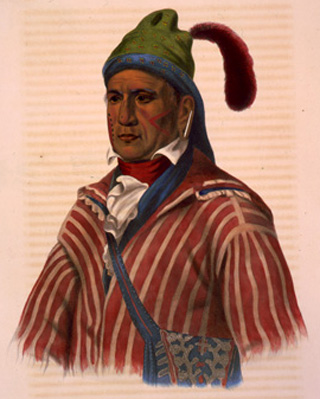Although the conclusion of the War of 1812 brought little change in the life of most American citizens, for American Indians it was disastrous. The loss of influential tribal chiefs and millions of acres of territory left tribal communities weakened and at the mercy of American expansionism.
Although Andrew Jackson and William Henry Harrison failed to “exterminate” the Indians, left them so weakened that renewed military challenges by an intertribal confederation were all but impossible.

Library of Congress, Prints and Photographs Division
By the time Jackson had “humbled” the Creeks, the war in the northwest had largely ended. The battle at Prophet’s Town accomplished what Americans had feared: an Indian-British alliance. Indeed, the action against the settlement seemed to confirm Tecumseh’s warnings and brought many into his camp. Those warriors who flocked to Tecumseh’s resistance movement were armed by and actively supported the British, bringing needed manpower to the Canadian front. More importantly, Tecumseh’s warriors were employed to harass American supply lines and threaten American posts, two of which were abandoned (Detroit and Fort Dearborn). In return, Americans took the war to the Indian country, burning Indian villages and fields and leaving civilians homeless and hungry. The bloody frontier battles, in which Tecumseh’s followers fought against both American regulars and militia, came to an end on Canadian soil at the Battle of Thames, in October 1813, with the defeat of the British and the death of Tecumseh.
The Treaty of Ghent ended the official war. The British negotiators initially demanded a consideration of Indian boundaries but soon dropped the issue, leaving negotiations with Indian tribes to the Americans. Thus, it was Jackson’s harsh treaty with the Upper Creeks at Fort Jackson in 1814 and the Treaty at Greenville, negotiated a month earlier by William Henry Harrison with the northwestern tribes, that ended the wars for the control of the west.
Victories against Indians gave Americans plenty of reasons to believe they had won “the war,” for by these treaties, they acquired millions of acres of Indian territory. Andrew Jackson and William Henry Harrison were the heroes of the age, for they had turned back the British threat, secured American borders, opened up vast tracks of Indian lands for settlement, and although they failed to “exterminate” the Indians, left them so weakened that renewed military challenges by an intertribal confederation were all but impossible.
Part of a series of articles titled American Indians and the War of 1812 .
Last updated: August 14, 2017
